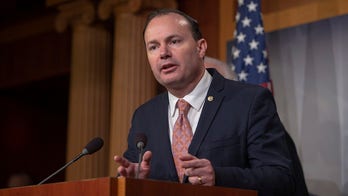The White House admitted today several Democratic governors complained about the Justice Department lawsuit against Arizona's immigration law - saying the legal fight is angering their constituents and distracting from federal efforts to boost the sluggish economy.
Reports of the confrontation first surfaced in the New York Times.
White House Press Secretary Robert Gibbs confirmed the Democratic discontent.
"From the reading that I got from the individuals that were at the meeting, that this came as a fairly small part at the end," Gibbs said. "We understand the frustration of all of those involved, Arizona included, in the federal government's inability to comprehensively deal with the problem of immigration."
Gibbs said the White House knows the lawsuit filed against Arizona's immigration law is ill-timed for Democrats in swing congressional districts and competitive Senate races.
"Everybody in a political season and in the calendar has certain equities," Gibbs said. "While the timing of these things may be inconvenient, this administration is here to do what it thinks is right, not simply to look at the calendar and then decide what is right."
The Democratic governors met with top White House officials Patrick Gaspard and Cecilia Munoz at a private session off the floor of the National Governors Association meeting in Boston.
Marshall Fritz, director of immigration policy at the Center for American Progress, the Washington think tank most in sync with the White House, said Democratic political anxieties are real and legitimate.
"I think everybody is focused on the elephant in the room, which is the economy," Fitz said. "Anything that seems like a distraction from the economy probably is creating some heartburn. For some members in tough races, they're probably concerned this is going to distract them from the message that they want to send which is that they are about trying to improve the economy and create jobs."
Dan Stein, of the Federation for American Immigration Reform, said the lawsuit against Arizona's immigration law could tip the balance of power in Congress.
"Thanks to the Arizona lawsuit, the Obama Administration has made sure that the immigration issue will play in every major campaign and that will work against the interests of incumbent Democrats," Stein said. "Illegal immigration is a huge concern among voters, certainly in the West, and all across the country. The Democratic governors are telling the administration, 'Hey, you guys are out of your mind.'"
Fitz supports the lawsuit and contends the administration had no choice but to confront political backlash.
"The administration did not create the timing for this," Fitz said. "This is the hand it was dealt. It is a constitutionally suspect law and I don't think the Justice Department had any choice but to file suit. Unfortunately, the timing is bad for some Democratic members of Congress. But it is what it is."
Attorney General Eric Holder may have added fuel to the political fire with his announcement on Face the Nation Sunday that he may file a second lawsuit if the first lawsuit fails in its attempt to stop the law from taking effect on July 29.
Some Republicans in high-profile races either oppose the Arizona law or are distancing themselves from it.
Texas Gov. Rick Perry, running in a tight race for re-election against Democrat Bill White, has said the Arizona's law is "not right" for his state. The most recent poll showing the race tied was produced by a firm that leans Democratic. The RealClearPolitics average shows Perry ahead by 4.7%.
Perry told Fox's Neil Cavuto that "every state is different" and Texas has dealt with illegal immigration on its own terms.
"Listen, I totally respect Jan's (Arizona Republican Gov. Jan Brewer) position of being able to do what she feels and her Legislature feels they need to be doing on that border," Perry said on "Your World with Neil Cavuto." "We have been actively pursuing this issue of border security. And here's the bottom line: you cannot have an immigration reform debate until you secure the border."
Watch Perry interview here.
In California, Republican gubernatorial nominee Meg Whitman opposes the Arizona law and has begun airing Spanish-language radio ads to drive home the point with Latino voters. That move drew immediate fire from Democratic rival Jerry Brown.
A new poll today showed Whitman running ahead of Brown. The RealClearPolitics average, which does not include this most recent survey, shows Brown leading narrowly.
Stein said the decisions of individual Republicans to pivot around the Arizona law makes news locally but not nationally. The Justice Department intervention, he argues, could generate a backlash among independent voters and possibly jeopardize Democrats in swing districts.
"Politically, it's one thing to say you're not sure if the Arizona law is right for your state," Stein said. "It's very different to file a lawsuit from the federal government actually appearing to declare war on Arizona's law and its effort to control illegal immigration."
Fitz said one of the political difficulties for Democrats is the Arizona law's evident popularity.
"There is support for it because the state is actually taking action," Fitz said. "What the American public more than anything wants to see is they want action. They really want an actual solution; the federal government and Congress stepping up and actually solving this problem once-and-for-all is what they support even more than they support the state taking action. But they see Arizona at the very least is trying to grapple with this situation."
Now the Justice Department is grappling with Arizona. Not just once, but maybe twice.
And Democratic governors reasonably fear they or their Democratic colleagues will have to grapple with the political fallout in November.




